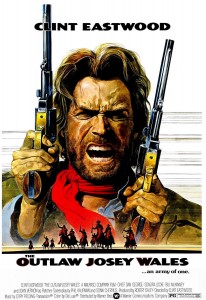 Thanks: 14
Thanks: 14
Results 1 to 15 of 2819
Threaded View
-
09-04-2017, 02:45 PM #11j7wild Guest

High Plains Drifter (1973)
http://www.imdb.com/title/tt0068699/

Between the time Clint Eastwood made the last movie in Sergio Leone's No Man's trilogy: 1966's The Good, the Bad and the Ugly and the time he made a more contemporary western in 1985 Pale Rider, he also made several other western films.
They were: starting with Hang' Em High in 1968, Paint Your Wagon, Two Mules For Sister Sara, Joe Kidd, High Plains Drifter, and The Outlaw Josey Wales in 1976.
Man!
This was a damn good movie.
An early Eastwood directorial too.
5/5
Joe Kidd (1972)
http://www.imdb.com/title/tt0068768/

In the western territory of future state of New Mexico, a former bounty hunter turned rancher unwillingly gets involved in a land dispute between ruthless, greedy wealthy white men and the Mexican peasants who have legal ownership of the land before it was forcefully taken from them by the white landowners settling west.
Featuring a cast of familiar actors including Robert Duvall, Don Stroud, John Saxon (he played the town Lieutenant, Nancy's father in A Nightmare On Elm Street and one of the tournament fighters contestants in Enter the Dragon), Dick Van Patten, Gregory Walcott (Plan 9 From Outer Space), I was expecting more action and more fleshing out of the characters and exposition on the land dispute.
Why?
The screenplay is written by Elmore Leonard and the film is directed by John Sturges:
the director of legendary films such as the Great Escape, the Magnificent Seven, the Eagle Has Landed, Bad Day at Black Rock, Ice Station Zebra, Gunfight at the O.K. Corral, and The Old Man and the Sea.
Plus the lead in to the climax was dumb. Supposedly a different ending was written and the producer jokingly said "... instead of doing the ending in the script, it would be silly but fun if we change it to this other thing..." and the cast and crew took his joke seriously and went with it.
3/5
The Outlaw Josey Wales (1976)
http://www.imdb.com/title/tt0075029

Josey Wales is a Missouri farmer who joins an elite Confederate guerrilla unit and together, they are responsible for defeating and routing many Union army units in several battles and skirmishes during the American Civil War.
When the war ended after the Union victory, all Confederate units are required to surrender to the nearest Union outpost and swear allegiance to the United States of America and to the Constitution of the United States.
Those who don't surrender and swear such allegiance are considered criminals and traitors and they will be hunted down until they are either captured alive or killed.
Josey Wales is one of those who refuses to surrender, especially when the Union unit he is supposed to surrender to was also the same one who were responsible for the murder of his wife and son a few years earlier at the beginning of the Civil War.
Wales decides to make his way to Texas or to Mexico, where most outlaws at the time fled to to avoid prosecution.
Along the way, with bounty hunters and union soldiers still in hot pursuit, he unwillingly picks up an odd group of strangers including a Kansas religious lady and her daughter, an old Cherokee, a Navajo woman, and many others.
Eastwood himself had said this film is one of the high point of his Western film career and he considers it to be the best Western he has ever made:
What? Really? Not Unforgiven? Which he won two Academy Awards for Best Picture and Best Director?
In 1996, The Outlaw Josey Wales was deemed "culturally, historically, or aesthetically significant" by the United States Library of Congress and selected for preservation in the National Film Registry. It was also one of the few Western films to receive critical and commercial success in the 1970s at a time when the Western was thought to be dying as a major genre in Hollywood. (source: wiki)
The strong cast does a good job at fleshing out the characters and building up their motivations and background stories.
The only weak link in the cast is Sondra Locke. She doesn't do much with the character she is portrayed.
5/5
Similar Threads
-
Recent Software Releases
By corfy in forum General Chatter - Non-Movie RelatedReplies: 7Last Post: 09-11-2007, 11:13 AM -
Fantastic Four Trailer Recent one
By venomscurse in forum Trailer MusicReplies: 1Last Post: 06-01-2007, 12:58 AM -
what was the most recent OST you have bought?
By st39.6 in forum General Chatter - Movie RelatedReplies: 0Last Post: 11-12-2005, 01:59 PM





 Reply With Quote
Reply With Quote
Bookmarks